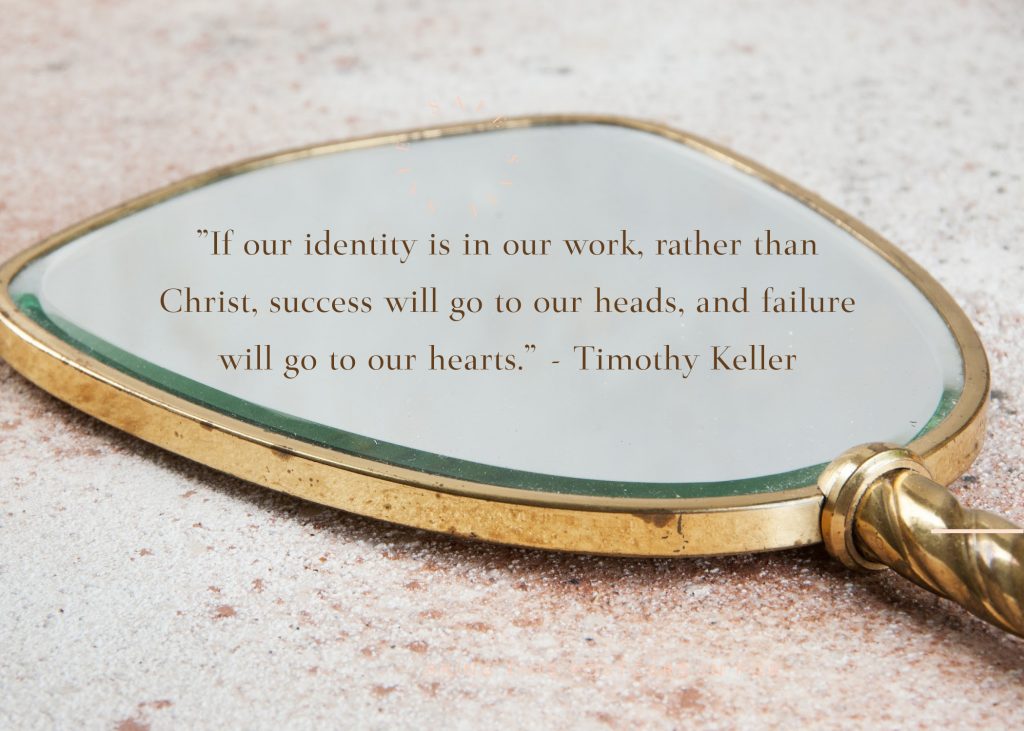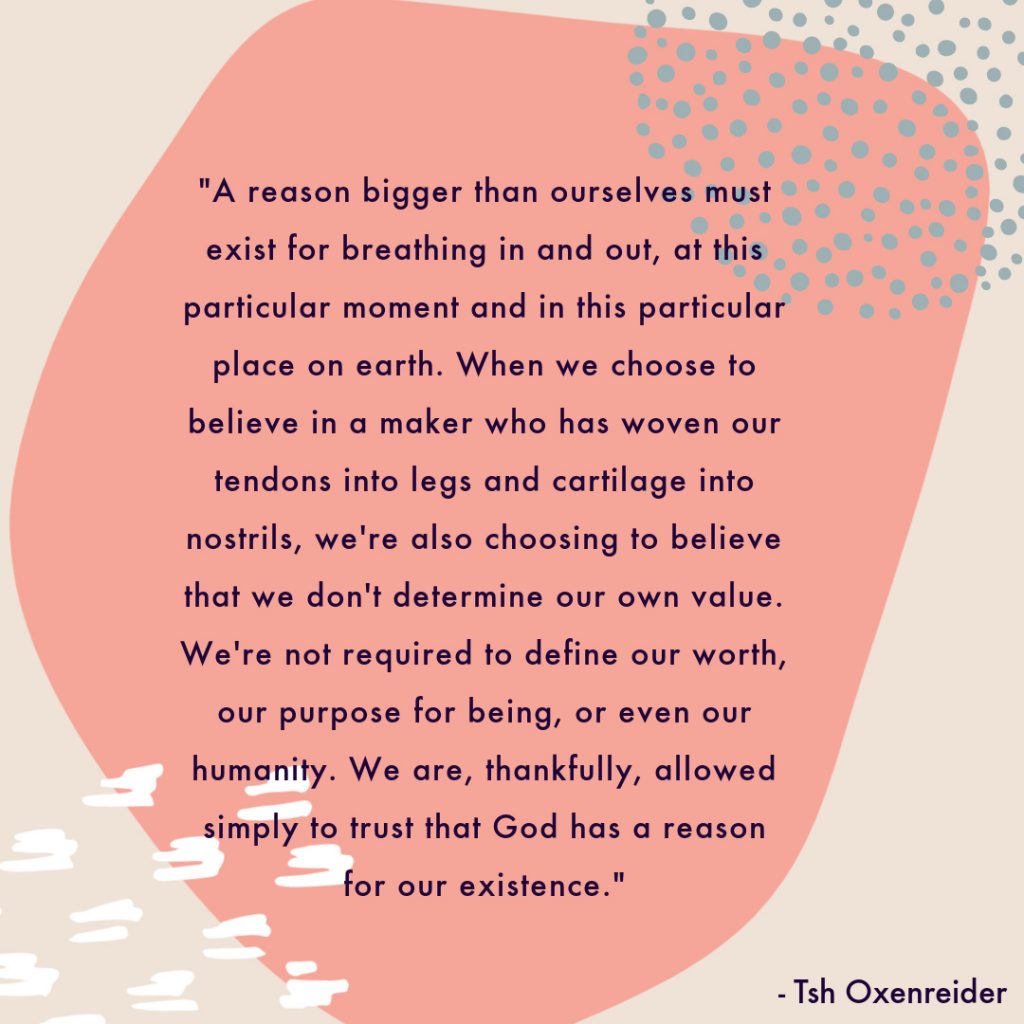Do you remember the self-esteem craze that took over our nation at the end of the last century? As a child of the 80s and 90s, I was the lucky recipient of nonstop messaging about how GREAT I was—and how special . . . just as special as every other person I knew.
Parent volunteers came into our public school classrooms, cradling cuddly teddy puppets who led us in chants like, “I have self-esteem, it’s true!” and instructing us to literally pat ourselves on our backs. Coaches handed out participation trophies to every soccer player (including my best friend and me, who literally spent the majority of each game sitting on our soccer balls in the middle of the field, stringing together flower chains while our male teammates carried on without us). Encouraging posters plastered our school hallways, and affirming picture books filled the library shelves. The message intended to wedge its way into our impressionable young minds was that we were all the absolute bee’s knees.
Sadly, the self-esteem craze didn’t exactly produce the results it was hoping for. Instead of transforming our society into a collection of benignly confident and largely altruistic citizens, the movement yielded an entire generation of fragile egos. My peers and I tended to choose one of two paths: selfish narcissism, or beleaguered self-loathing. We think too highly of ourselves, or too little, many of us hopping back and forth between these disparate emotions numerous times over the course of a day.
Identity and confidence are topics that have come up for me a lot lately. I’ve been reading about these subjects some, discussing them more, and thinking about them most of all. This pair of topics has come up a bit in my writing lately, but they are worth circling back to (if only because they are words I need to write).
I shouldn’t be surprised that these themes continue to surface: we may have moved past the cheeky self-esteem jingles of my childhood, but we are still living in a society set on micromanaging our egos—either to build them up, or trample them to the ground (whichever fits the current political narrative or marketing scheme). And whether or not we are aware of this manipulative messaging, we quickly fall prey to it because we all WANT to feel good about ourselves. We all are longing for a strong sense of identity and unshakeable confidence. We set our sights on becoming our best selves, our truest selves, the selves that are happiest and most fulfilled. Much of our money and most of our time is spent trying to gain access to these very things.

This innate desire to feel comfortable in our skin, resting in the knowledge of a grounded identity, is not new. It also isn’t unimportant. I have been reading about the Israelites in my daily Bible readings, and I keep coming across passages in which the Lord instructs His people on how to build up their identity as a holy people, set apart from other tribes and nations. There were practices and laws they were to embrace, holidays they were to celebrate, and stories they were to rehearse and pass on—all for the sake of reminding them of WHO they were and WHOSE they were. God provided them with a people group to belong to, as well as giving each Israelite a family identity (solidified through the naming of each tribe and instructions for where each group should live and what roles they were tasked with doing).
For hundreds of generations, young children did not need lessons in self-esteem, because there was no question as to who they were. As part of families and faith systems, they belonged, and as recipients of collectively understood beliefs and values, they had a purpose. But as we have shifted more and more towards a post-faith society where religion is a taboo and traditional values are passé, the awareness of purposefulness that was once a birth right has slowly slipped away. A rise of individualism has replaced all sense of patriotism or family pride; we fend for ourselves now, even if we don’t know what our selves stand for or even how to go about standing at all.
Still, that need for an identity remains. So we turn to trendy diets, to political parties, to careers and to hobbies to help us understand what we are all about, because we NEED to be part of something bigger than ourselves. We throw ourselves into our jobs, our families, or our pet projects because we NEED to have a purpose. We try on new labels (from personality types to gender pronouns to mental diagnoses) to see how they feel because we NEED to know who we are. There isn’t anything inherently wrong in these pursuits. The problem comes in when we start to find our entire value, our whole sense of identity and self-worth, in these temporal titles and passing pursuits. These worldly pastimes and occupations were never meant to hold the weight of our entire egos; these makeshift identity-pedestals crumble under the pressure we’ve placed upon them, shattering our understanding of belonging and purpose and leaving us scrambling for more feel-good messages to prop us up until the next source of identity comes along.
The answer to our warring crises of narcissism and shame is humility—not thinking less of ourselves, but simply thinking of ourselves less. And as we replace incessant navel-gazing with healthy Christ-focus, we find the identity, purpose, and fulfillment we seek. As members of God’s family, we are part of something bigger than ourselves. As His beloved children, created by Him for relationship with our Creator and with one another, we know who we are and why we are here. Looking to Scripture, we gain a clear understanding of what we are all about.
The truth is that on our own, none of us is deserving of those Awesome! stickers plastered on us as kids. We are all broken, selfish, and sinful. Deep down, we know that we could never earn those boastful participation trophies or live up to affirming mantras about our greatness. We are too intimate with our shortcomings to give much heed to baseless claims that we are “perfect just the way we are.” But in Jesus, we have a Savior who IS perfect, who was without sin or selfishness, who poured out His life for the sake of our healing. The Son of God who had every reason to boast instead adopted humility, and He invites us to do the same.

We praise, honor, and glorify our Heavenly Father because He asks us to, and because He is altogether worthy of our worship. These are reasons enough to bend our hearts toward Him. But an unexpected blessing that comes through our worship is that sense of identity and belonging and purpose we all crave. It may be a backwards approach to “finding ourselves,” but it’s the only approach that will land us in a place of healthy security and strength. On our knees before the Lord, there is no doubt about WHO we are and WHOSE we are. No inflated ego, no shame; no shaky platforms of self-esteem; just solid, secure, and eternal sonship of the Lord Most High.